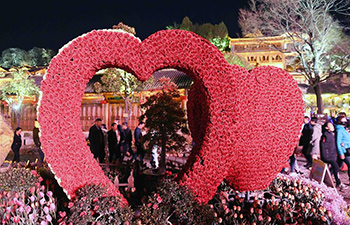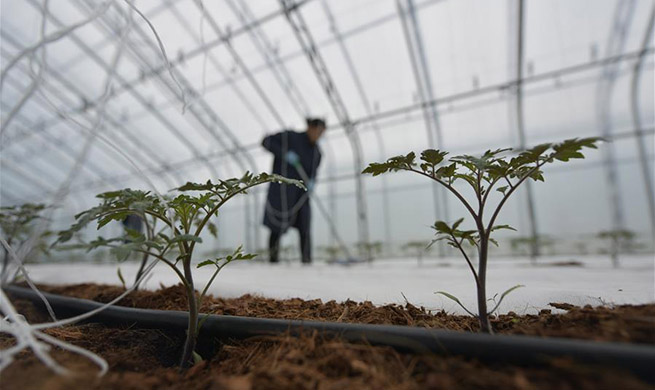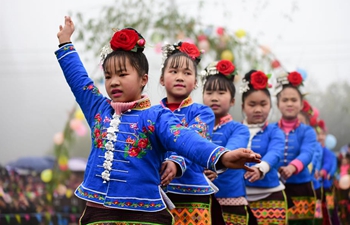SHIJIAZHUANG, Feb. 13 (Xinhua) -- For most Chinese people, the Lunar New Year means a happy family gathering and festive fireworks. But that is not the case for fire lookouts Zhao Fuzhou and Chen Xiuling.
It was another Spring Festival that the couple spent in a snow-covered forest, lonely and quiet.
Zhao and Chen work at Saihanba, a vast man-made forest covering about 93,000 hectares in north China's Hebei Province, 400 km north of Beijing.
Their job is to observe the area every 15 minutes at the tower located at the southern end of the forest, reporting any smoke or fire that could destroy the forest.
Planted on barren land more than half a century ago, the Saihanba forest purifies 137 million cubic meters of water for the Beijing-Tianjin area and delivers half a million tons of oxygen.
In late 2017, the Saihanba afforestation community scooped the UN Champions of the Earth Award for its outstanding contribution to the restoration of degraded landscapes.
More than 20 couples have guarded the area over the past decades, taking turns as lookouts at the nine towers in the forest around the clock.
"The job is dull but important," Zhao said. "Any negligence may cause serious consequences."
Zhao is familiar with every rock and every ditch. Distinguishing smoke from fog is a must.
Last month, he spotted smoke.
"The fire was started around 2:30 p.m. by a child playing nearby, and I called the command center 12 minutes after it had started," said Zhao.
The fire was put out quickly and, the head of the forest farm came to thank him.
"We witnessed how hard it was to turn the barren land into a forest, so we can't afford to lose it," Zhao said.
At Saihanba, where winter could last seven months and temperatures could drop to minus 43 degrees, planting trees is tough. People cultivated seedlings and took care of them throughout the year to help the trees survive. Guarding the trees is also tough.
"Once the first snow of the year falls, no one will show up for months. It will be only us," said Zhao's wife Chen.
The Lunar New Year is the hardest time and also when they miss their family most.
"I just felt awful," she said.
Their son, a forest fireman, also had to be on duty during New Year's Eve, leaving his wife and two children at home.
"In the past, I alway complained why my parents could not be with me for the festival. Now that I have become a fireman and realized the importance of looking out for fire, I understand them," said their son, Zhao Dongyang.
The senior Zhao and Chen were assigned the job 36 years ago. The lookout venue they lived in was two-story abode house, with a telephone and a lamp being the only electric appliances.
"The lamp bulb and the telephone sparked whenever there was a thunderstorm. It was very scary," Chen recalled.
To avoid fire, they did not have the stove on at night. A half bowl of water placed at the bedside would ice up the next morning, Zhao said.
Because of poor road access, the forest would be isolated completely after being besieged by snow, leaving the couple only pre-stored potatoes and cabbage for meals during the winter.
This year is different. With carbon sink revenue, in 2018 the forest farm had a new concrete road built and broadband network coverage.
"Whenever I miss my grandsons, I can give them a video call," Zhao said with a smile.
Chen made six dishes this year to celebrate the Lunar New Year, including stewed ribs and chicken. They also bought festival couplets to decorate their dorm as well as the tower -- now a five-story building.
Zhao has turned 59. The forest farm will assign a young man to take his place when he retires at 60.
"I hope we can leave the forests created by generations of Saihanba people to our offspring," he said.

















